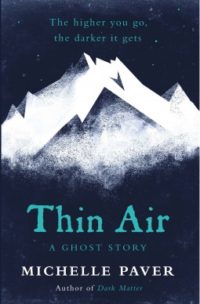The vast, unsentient reality that’s always present
 Thin Air
Thin Air
by Michelle Paver
When this was picked for my book club I was pleased because I really enjoyed Paver’s previous novel Dark Matter. However, this was basically the same story in a different setting and not done quite as well. I still enjoyed it, but there was the missed opportunity here to be a little more original.
Dr Stephen Pearce has joined his brother Kit’s mountaineering expedition at the last minute because they need a medic. But this isn’t just any jaunt up a mountain; this is an attempt to be the first to successfully climb Kangchenjunga, the third highest mountain in the world, straddling the border of Nepal and India.
It’s the early 1930s and rich Europeans are obsessed with racing each other to the extreme points of the world. Kit’s plan is to follow in the footsteps of his hero Edmund Lyell, whose disastrous 1907 expedition came the closest to date to reaching the summit of Kangchenjunga. Stephen dislikes this idea and feels they should strike their own path, especially after an ominous warning from the last survivor of the Lyell expedition, Charles Tennant. But Stephen is not only the newbie to the group, but also the least experienced climber, and as such has no real vote.
Stephen is frustrated that fog obscures the view of Kangchenjunga for weeks before he gets his first glimpse. He’s spooked by Tennant’s warning and any reminder of the Lyell expedition. But there’s something else as well, a shadowy figure on the mountain that at first Stephen dismisses as a trick of the light, but later becomes convinced is a ghost, and not the harmless kind.
“Photographs fail utterly to convey its power. From my perch on the spur, the glacier leads towards it like a shimmering royal road – although that’s putting a human gloss on something which has nothing to do with humanity.”
Because Stephen narrates the story, there are clues that his mental state is fragile but it can never be clear. This ambiguity feels deliberate and is what saved the novel for me. Unlike in Dark Matter, I was never persuaded by the ghost. But I did still feel the tension and fear for what was coming next.
However, there is more to this book. The setting and the mountaineering story are brilliantly evoked – Paver has clearly done her homework. I also enjoyed the relationships between the men. The two brothers are fractious, always rivals. There is no cheesy resurrection of their boyhood closeness; instead there are brief moments of detente sparked by memory.
“The Sherpas are wrong. This mountain has no spirit, no sentience and no intent. It’s not trying to kill us. It simply is. Being on a mountain forces us to confront the vast, unsentient reality that’s always present behind our own busy little human world, which we tuck around ourselves like a counterpane, to keep out the cold.”
The other major theme, which, like the ghost, didn’t work for me, is racism. These are rich Englishmen in India and Nepal in the 1930s; racism is inevitable. But the way Paver handles it in the narration felt a little too modern, as well as too obvious. Stephen doesn’t just report, for example, Major Cotterell’s decision to withhold boots for the native porters and guides, he is the good guy, expressing his misgivings and trying to get to know at least his own guide, Nima.
The setting and Stephen’s background mean that the language is stilted but it’s still very readable and I did enjoy the experience. I flew through the book in two days. And I did love the dog. Inevitably. I’m still curious about Paver’s other works, but this really did have a lot in common with Dark Matter.
Published 2016 by Orion Books.
Source: Foyles.